Key takeaways:
- Trade compliance is essential for avoiding financial penalties and maintaining a trustworthy reputation with partners and customers.
- Common challenges include misclassification, restricted party screening, and rapidly changing regulations, necessitating careful documentation and consistent review processes.
- Proactive strategies such as regular training, clear communication, and the adoption of technology can significantly enhance compliance management and streamline operations.
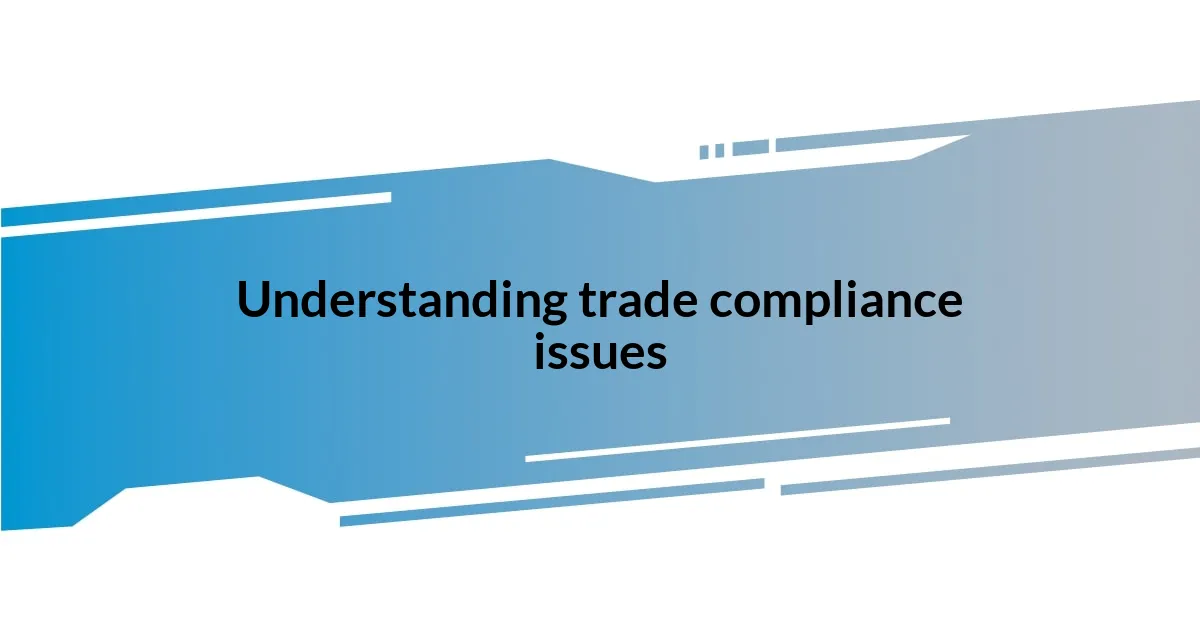
Understanding trade compliance issues
Trade compliance issues can feel overwhelming, especially when you consider the various regulations and guidelines that govern international transactions. I recall a time when a shipment I was responsible for almost got delayed due to a simple misclassification of goods. Have you ever experienced a similar situation? It really drives home the importance of understanding not just the rules, but also the nuances behind them.
As I navigated the complexities of compliance, I found it essential to stay updated on changes in trade regulations. It can be frustrating when new laws come into play unexpectedly, shifting the landscape of what’s acceptable. I often wondered, what resources are really dependable? For me, establishing solid relationships with compliance experts made a difference. They provided insights that I couldn’t find in dense legal texts.
Ultimately, grasping trade compliance issues requires diligence and a proactive approach. I learned that ignorance isn’t bliss; it’s a risk. Keeping an eye on changing policies and maintaining clear documentation are key. Have you ever taken a moment to evaluate your own practices? It’s a small step that can save you from significant headaches down the road.
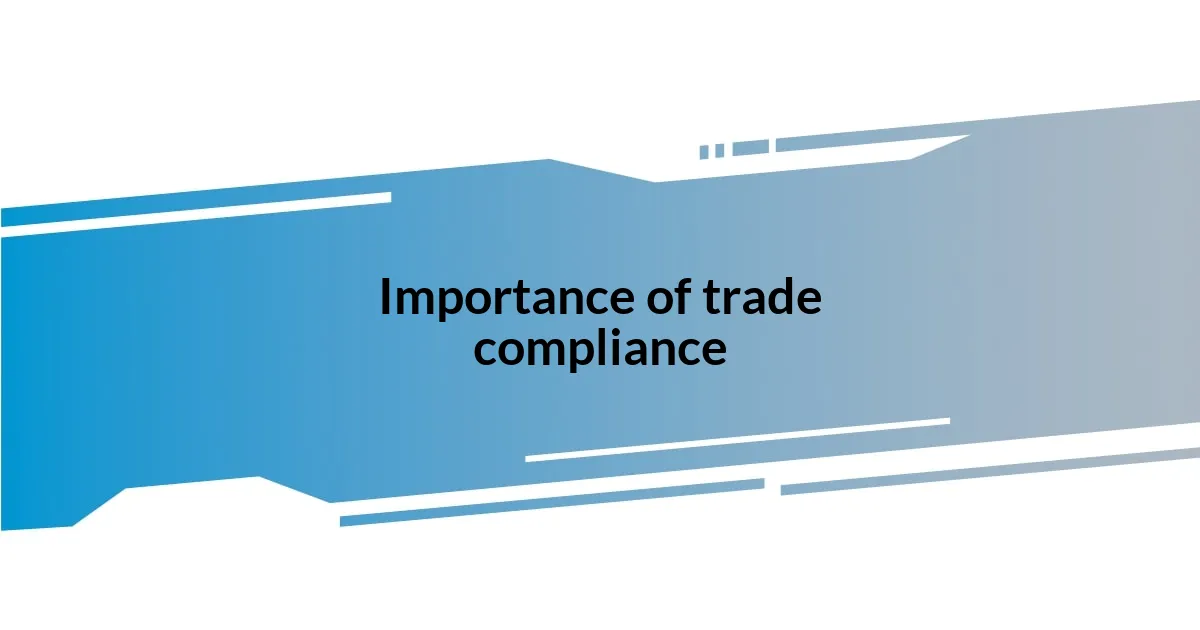
Importance of trade compliance
Trade compliance is crucial for any business involved in international trade. From my experience, ensuring compliance not only prevents costly penalties but also fosters trust with suppliers and customers. I vividly recall a supplier who hesitated to work with us after a minor compliance issue arose. This incident reminded me just how much the reputation of a company hinges on their commitment to following the rules.
To put it simply, here are some key reasons why trade compliance matters:
- Avoid Financial Penalties: Non-compliance can lead to fines and economic losses that impact your bottom line.
- Enhance Reputation: Businesses with strong compliance practices are viewed as trustworthy and reliable partners.
- Facilitate Smooth Operations: Proper documentation and understanding of regulations can streamline processes and reduce delays.
- Build Customer Confidence: Customers are more likely to engage with companies that prioritize trade compliance, knowing they adhere to regulations.
Thinking about it now, the peace of mind that comes from knowing you’re in compliance is invaluable, far outweighing the time I invest to stay informed.
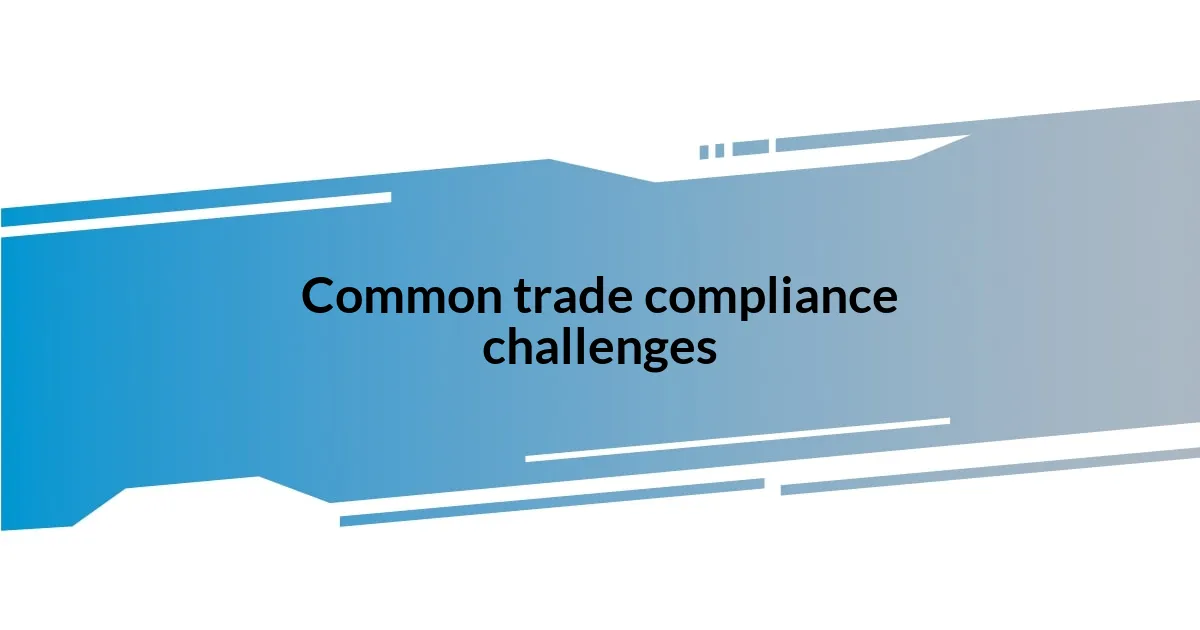
Common trade compliance challenges
Trade compliance challenges are a reality that many businesses face, often unexpectedly. For instance, I once misjudged the country of origin for a product, leading to a lengthy hold-up at customs. The stress was palpable as I tracked the shipment, worrying whether it would impact crucial client deadlines. This experience underscored how a seemingly minor detail can spiral into a larger compliance issue, reinforcing the need for meticulous attention to every aspect of documentation.
Navigating restricted party screening can be another daunting task. I remember spending late nights combing through lists, ensuring our practices aligned with regulations. The potential repercussions of overlooking a sanctioned entity can be severe, ranging from hefty fines to damage to customer trust. It’s a constant balancing act, and I’ve learned that investing in automation tools can ease this burden by catching overlooked details in real-time.
Another common challenge is keeping abreast of ever-changing regulations. I once faced a situation where a new trade agreement altered tariff rates overnight, impacting our pricing strategy. It felt like racing against time to adapt. My takeaway? Establish a consistent review process. This not only helps to manage risks but also positions your business to be agile when changes occur. Have you found effective ways to stay informed? I’ve learned that leveraging reliable news sources and industry contacts is invaluable.
| Challenge | Impact |
|---|---|
| Misclassification of Goods | Potential shipment delays and fines |
| Restricted Party Screening | Legal repercussions and loss of trust |
| Changing Regulations | Unexpected costs and operational adjustments |
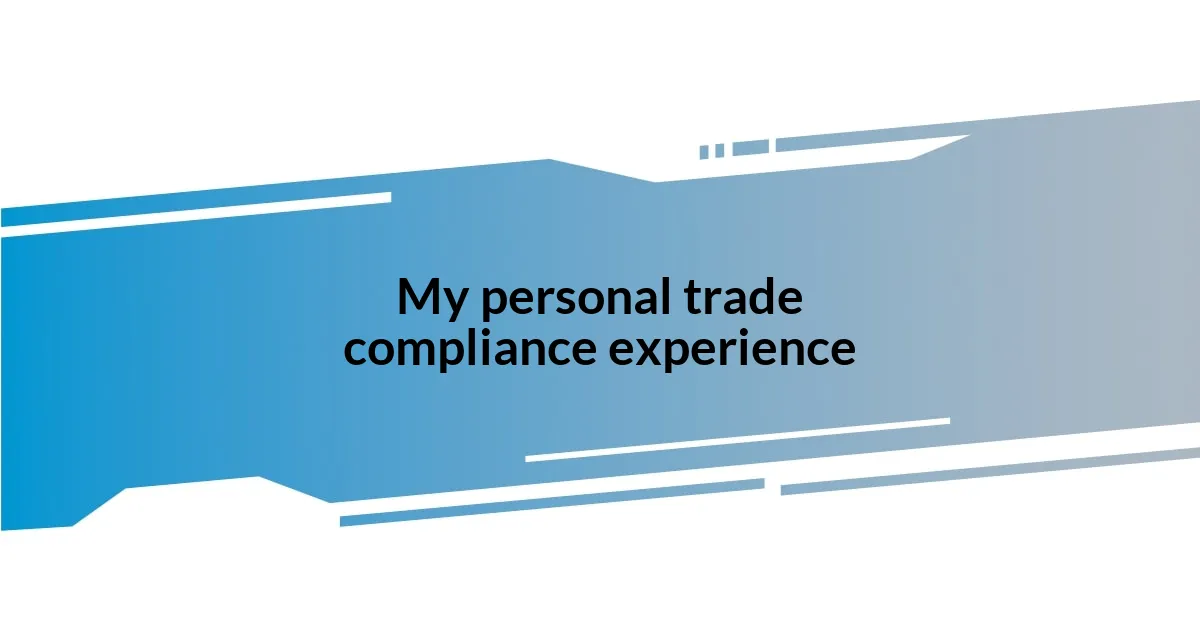
My personal trade compliance experience
When I think about my experience with trade compliance, a few moments stand out. One time, I submitted documentation that I thought was flawless, only to receive a notice from customs questioning the accuracy of one of my descriptions. The frustration was tangible—I remember staring at my screen, wondering how I could have overlooked something so critical. That incident taught me the importance of double-checking every detail, no matter how minor it seems.
Another memorable moment was when I realized the impact of local regulations on our operations. I coordinated with a logistics team overseas, and they flagged a compliance requirement I had never encountered before. It felt like an icy breeze when it hit me: the potential delays and costs if we failed to meet their stringent rules. Reflecting on that, I’ve come to appreciate that staying updated on local laws isn’t just necessary; it’s vital for maintaining smooth operations.
I often ask myself: how do I keep my compliance knowledge sharp? For me, attending webinars and participating in industry forums has made a noticeable difference. These platforms not only offer insights into current trends but also allow me to share experiences with others who’ve faced similar challenges. Connecting with peers on this topic has been incredibly reassuring, reminding me that we are all navigating this complex landscape together.
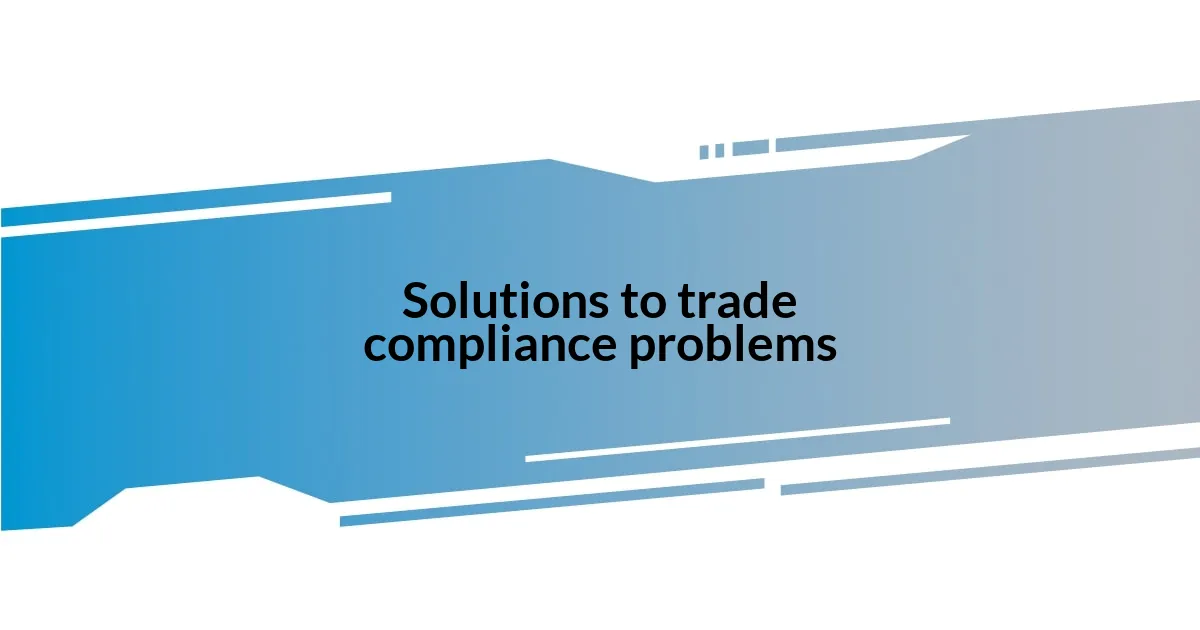
Solutions to trade compliance problems
Tackling trade compliance issues can feel overwhelming, but I’ve learned that a proactive approach makes all the difference. For instance, I once established an internal audit schedule specifically for our compliance documents. This routine not only caught errors before they reached customs but also fostered a culture of accuracy within our team, transforming what once felt like a reactive process into a seamless part of our operations.
In my experience, technology can be a game-changer. Integrating compliance management software helped streamline our restricted party screening. One late evening, I marveled at how a simple alert from the system saved us from what could have been a disastrous shipment. It dawned on me that leveraging these tools not only relieves stress but also empowers our team with confidence in our processes.
Have you ever considered the power of training? I invested in regular compliance training for our staff, and the change was palpable. One employee shared how understanding the rationale behind regulations inspired them to be more diligent. It reminded me that a well-informed team can be the first line of defense against compliance failures and that fostering this knowledge creates a more resilient organization.
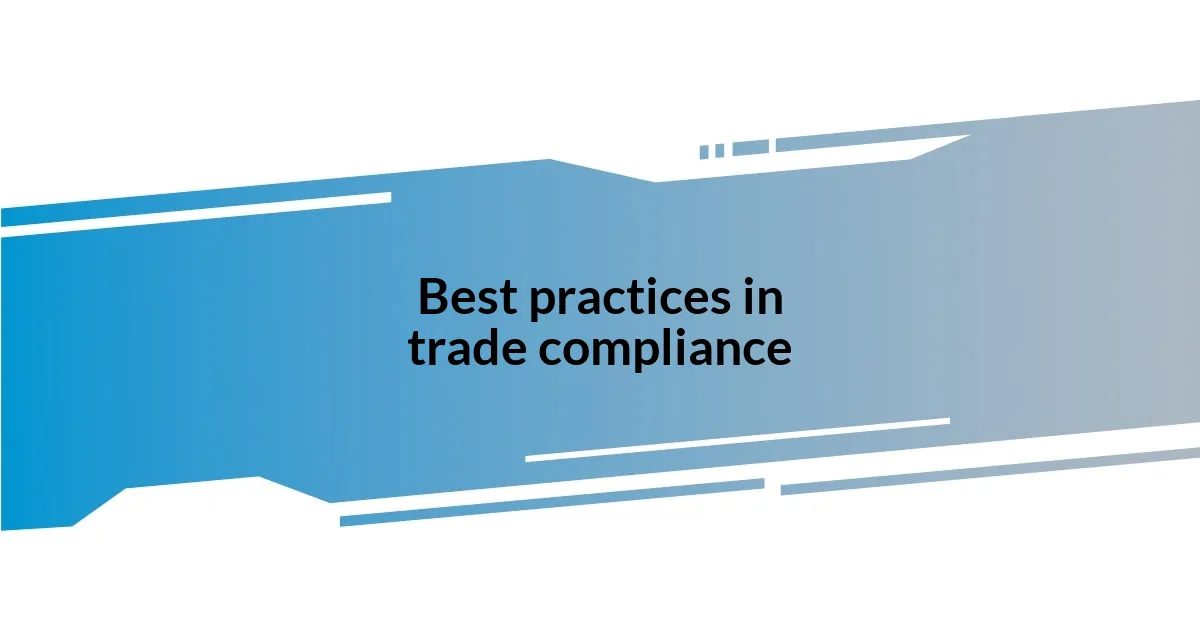
Best practices in trade compliance
When I think about best practices in trade compliance, I can’t help but emphasize the significance of clear communication across teams. There was a time when misalignment with a sales team led to a shipment that didn’t meet regulatory standards. That moment still sends chills down my spine! It highlighted an essential lesson: regular meetings and open communication channels can prevent costly mistakes. After that, we established weekly touchpoints that kept everyone on the same page, and the improvement was immediate.
I’ve also learned that documentation should be treated as a living entity. I recall a situation where outdated customs forms almost derailed a crucial delivery. Thankfully, a teammate noticed the discrepancy just in time! This experience taught me that routinely reviewing and updating compliance documents is invaluable. I recommend keeping a shared checklist that is easily accessible for all team members, ensuring everyone can contribute to maintaining accuracy and up-to-date information.
Let’s not overlook the power of mentorship in trade compliance. I once paired a junior employee with a seasoned compliance officer to address their questions and concerns. Watching their relationship grow was rewarding! It reminded me that creating mentorship opportunities can nurture a culture of compliance within the organization. It fosters collaboration and promotes knowledge sharing, which can significantly enhance overall compliance understanding and effectiveness within the team.
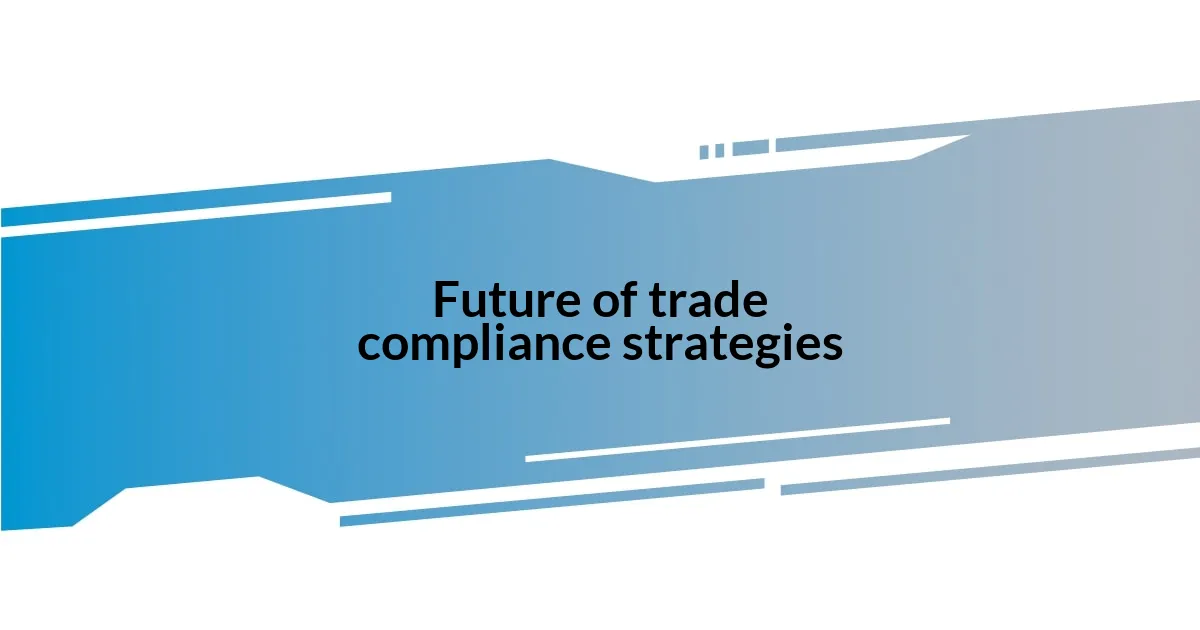
Future of trade compliance strategies
As I reflect on the future of trade compliance strategies, I see a rising trend toward automation. There was a time when manually sifting through endless compliance documents felt like an uphill battle. I remember the relief I felt when our team adopted artificial intelligence tools that not only flagged non-compliance issues but also suggested remedial actions. Isn’t it incredible how technology can transform a daunting task into a streamlined process?
Looking ahead, collaboration among stakeholders will be crucial. I once attended a forum where regulators, importers, and technology providers gathered to share insights. The conversations were eye-opening! They emphasized that a cooperative approach can significantly enhance compliance frameworks, ensuring everyone works toward a common goal. Wouldn’t it be wonderful if we could all align our efforts to foster a more compliant and efficient trading environment?
Lastly, let’s not underestimate the importance of continuous education. The landscape of international trade is ever-evolving, and I remember a moment when an unexpected regulatory change nearly caught us off guard. I quickly realized that a culture of ongoing learning is essential. By staying updated through workshops and seminars, our team can remain agile and adaptable. How do you plan to equip your team for the future? Sharing insights today can pave the way for a more resilient compliance strategy tomorrow.
